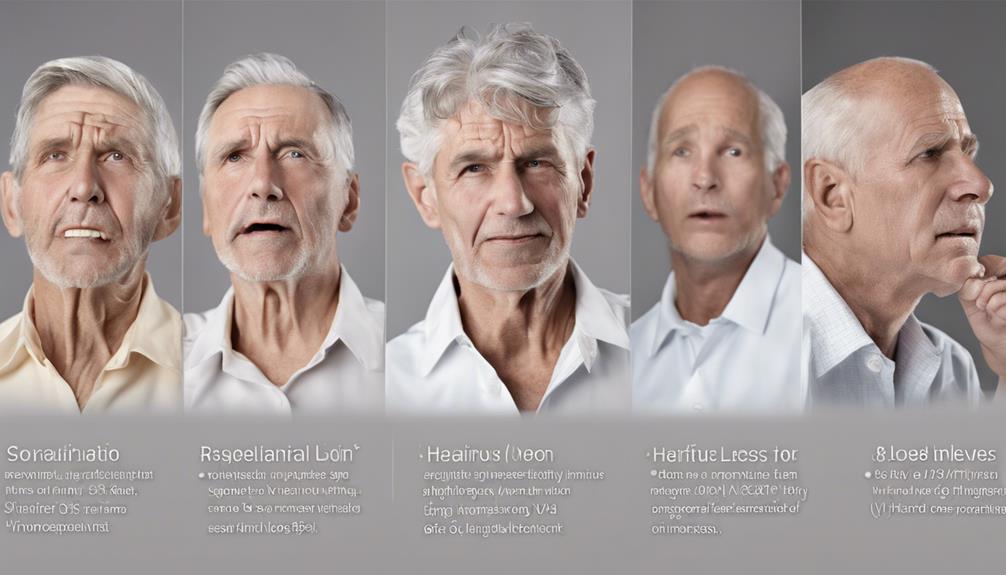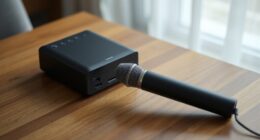When it comes to treating mild hearing loss and tinnitus with hearing aids, the saying ‘prevention is better than cure’ still holds true. But what should be done if these problems have already appeared and the goal is to find successful ways to manage them?
Well, let's explore some insightful strategies that could make a remarkable difference in your auditory well-being.
Key Takeaways
- Hearing aids reduce tinnitus annoyance and enhance hearing clarity.
- Tailored solutions based on individual needs and lifestyle improve management.
- Opt for advanced hearing aids with tinnitus-masking features for optimal results.
- Counseling and personalized fitting optimize tinnitus management with hearing aids.

ELEHEAR-Beyond OTC Hearing Aids, AI Powered Speech Enhancement and Tinnitus Masking, Superior Sound Quality, Connectivity with iOS or Android Devices via Bluetooth 5.3, for Seniors and Adults
Super Clear Sound – Powered by VocClear AI Technology with maximum gain of up to 50 dB and…
As an affiliate, we earn on qualifying purchases.
As an affiliate, we earn on qualifying purchases.
Understanding Mild Hearing Loss and Tinnitus
Understanding mild hearing loss and tinnitus is crucial for individuals to effectively manage these conditions and improve their quality of life. Mild sensorineural hearing loss (MSNHL) affects a significant portion of the population, with 9-15% of individuals older than 15 years experiencing this condition. Tinnitus, characterized by the perception of sound without an external source, is prevalent in about 10-15% of the U.S. population and often coexists with hearing loss.
For those with MSNHL, seeking appropriate interventions like hearing aids can't only assist in managing hearing loss but also alleviate tinnitus symptoms. Despite the benefits that hearing aids offer in managing tinnitus, only 20% of individuals with sensorineural hearing loss opt for these devices.

Karthus Hearing Aids, Rechargeable Hearing Aids for Seniors with Hearing Loss, Noise Cancelling & Clear Sound, Comfort & Invisible, 100H Long Battery, 7 Level Volume, One-Button Operation, Skin
🔊 Clear sound: 40db ultra-high gain and 16-channel dsp deliver natural, distortion-free audio for conversations or tv. the…
As an affiliate, we earn on qualifying purchases.
As an affiliate, we earn on qualifying purchases.
Benefits of Using Hearing Aids

To effectively manage mild hearing loss and tinnitus, harnessing the benefits of using hearing aids is a pivotal step towards improving auditory function and quality of life. Hearing aids offer a range of advantages, including providing tinnitus relief by restoring auditory input and enhancing hearing clarity. Studies indicate that approximately 68% of individuals experience a reduction in tinnitus annoyance when using hearing aids, making them particularly effective for those with mild hearing loss. Furthermore, newer hearing aid models come equipped with sound therapy features that can help distract from tinnitus noises and promote relaxation. Collaborating with healthcare professionals allows for the development of personalized treatment plans that incorporate hearing aids, ensuring a tailored approach to managing tinnitus and hearing loss. By embracing the benefits of hearing aids, individuals can significantly improve their auditory experience and overall well-being.
| Benefits of Using Hearing Aids | |
|---|---|
| Tinnitus Relief | Sound Therapy |
| Mild Hearing Loss Management | Personalized Treatment Plans |

Sound Oasis® Bluetooth® Tinnitus Sound Therapy System® – Sleep Better, Manage and Mask Tinnitus, 25 Built-in Sounds for Tinnitus Relief, 12-Hour Sound Duration
Play 25 Built-in Sounds: Discover a variety of sounds designed specifically for all night tinnitus relief, recommended by…
As an affiliate, we earn on qualifying purchases.
As an affiliate, we earn on qualifying purchases.
Choosing the Right Hearing Aid
Selecting the right hearing aid for managing mild hearing loss and tinnitus involves considering your individual hearing abilities, the severity of your tinnitus, and your lifestyle preferences.
When choosing a hearing aid, it's crucial to evaluate the sound frequencies affected by your tinnitus to ensure the device can effectively address those frequencies. Look for hearing aids with tinnitus-masking features, such as customizable sound therapy, to help distract from tinnitus sounds and provide relief.
Consulting with an audiologist is essential to ensure the hearing aid is tailored to your specific hearing needs and tinnitus symptoms. Opting for prescription hearing aids with advanced sound processing functions can offer better tinnitus relief and overall enhancement of your hearing experience.

ELEHEAR-Beyond OTC Hearing Aids, AI Powered Speech Enhancement and Tinnitus Masking, Superior Sound Quality, Connectivity with iOS or Android Devices via Bluetooth 5.3, for Seniors and Adults
Super Clear Sound – Powered by VocClear AI Technology with maximum gain of up to 50 dB and…
As an affiliate, we earn on qualifying purchases.
As an affiliate, we earn on qualifying purchases.
Tips for Managing Hearing Difficulties

In managing hearing difficulties, positioning oneself in optimal listening environments can significantly reduce background noise and enhance communication clarity. Informing others about your hearing challenges is essential to foster understanding and facilitate effective communication.
Staying engaged in conversations by providing context can help overcome obstacles posed by mild hearing loss. Utilizing assistive devices such as hearing aids is crucial for amplifying sounds and improving hearing clarity during daily activities.
Consider exploring over-the-counter (OTC) hearing aids that offer features like volume control and compatibility with devices to manage mild hearing loss and tinnitus. These aids can provide tinnitus relief and enhance your overall auditory experience.
Improving Quality of Life With Hearing Aids
Enhancing the quality of life for individuals with mild hearing loss and tinnitus is a primary goal achieved through the effective use of hearing aids. Studies have shown that wearing hearing aids can lead to a significant reduction in tinnitus severity, as assessed by tools like the Tinnitus Handicap Inventory and Visual Analog Scale. Individuals experiencing untreated sensorineural hearing loss and chronic tinnitus can see notable improvements in tinnitus annoyance after six months of wearing hearing aids.
Psychoacoustic measurements, such as changes in tinnitus pitch and loudness, demonstrate the efficacy of hearing aids in managing tinnitus symptoms and enhancing overall well-being. Counseling sessions and personalized fitting of hearing aids are vital components in optimizing tinnitus management strategies. By utilizing these strategies, individuals can experience a substantial improvement in their quality of life, reducing the impact of tinnitus noises and enhancing their overall hearing experience.
Frequently Asked Questions
What Can You Do for a Minor Hearing Loss?
For minor hearing loss, we can explore various solutions. Seeking help from a professional audiologist is crucial. They'll assess your hearing and recommend appropriate interventions.
In some cases, hearing aids may be suggested to amplify sounds and improve communication. It's essential to address minor hearing issues promptly to prevent potential impacts on daily life.
Can Tinnitus Be Treated With Hearing Aids?
Yes, tinnitus can be treated with hearing aids. These devices amplify external sounds, diverting attention from tinnitus noises. By providing relief or reducing noticeability in 68% of cases, hearing aids offer customizable programming to mask tinnitus frequencies and promote relaxation.
Advanced sound processing functions in prescription hearing aids automatically adjust for optimal tinnitus management. Matching the frequency range of tinnitus sounds with the right hearing aids can effectively alleviate tinnitus symptoms.
How Do You Deal With Hearing Loss and Tinnitus?
Dealing with hearing loss and tinnitus can be challenging, but there are effective ways to manage these conditions.
Seeking professional help, such as consulting with audiologists for customized solutions, can greatly improve our quality of life.
Using hearing aids with sound therapy features and AI technology can provide relief by amplifying external sounds and distracting from tinnitus noises.
It's essential to explore options that match our specific needs to enhance our hearing experience.
Do Hearing Aids Help With Mild Hearing Loss?
Yes, hearing aids can greatly assist with mild hearing loss. These devices amplify sounds, enhancing clarity and comprehension. Studies indicate improved speech understanding and overall quality of life for individuals with mild sensorineural hearing loss.
In noisy settings, hearing aids are particularly effective, enabling better engagement in conversations and social interactions. They can also alleviate communication challenges and reduce annoyance from tinnitus.
Conclusion
In conclusion, embracing the benefits of using hearing aids can be a breakthrough in managing mild hearing loss and tinnitus. By choosing the right aid and working closely with healthcare professionals, we can navigate through the challenges and improve our quality of life.
Let's amplify our ability to enjoy sound and silence, and silence the struggles of tinnitus with the power of personalized hearing solutions.










